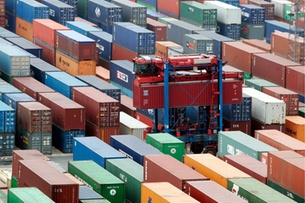Switzerland climbed the rankings, but overall globalisation is down, the report says. (Keystone) - Click to enlarge Switzerland is the second-most globalised country in the world after the Netherlands, according to the latest edition of an index prepared by the University of Zurich. The Alpine nation has moved up from fifth place. The index prepared by the KOF Swiss Economic Instituteexternal link tracks countries’ levels of globalisation across politics, economics, and society. The current edition uses data up to and including the year 2015. Surprisingly, Switzerland was not top of the pile when it came to economic globalisation, which usually lists financial or trading hubs. Its strongest showing was in the
Topics:
Swissinfo considers the following as important: Business, Featured, newsletter, Swiss Markets and News
This could be interesting, too:
Nachrichten Ticker - www.finanzen.ch writes Die Performance der Kryptowährungen in KW 9: Das hat sich bei Bitcoin, Ether & Co. getan
Nachrichten Ticker - www.finanzen.ch writes Wer verbirgt sich hinter der Ethereum-Technologie?
Martin Hartmann writes Eine Analyse nach den Lehren von Milton Friedman
Marc Chandler writes March 2025 Monthly

Switzerland climbed the rankings, but overall globalisation is down, the report says. (Keystone) - Click to enlarge
Switzerland is the second-most globalised country in the world after the Netherlands, according to the latest edition of an index prepared by the University of Zurich. The Alpine nation has moved up from fifth place.
The index prepared by the KOF Swiss Economic Instituteexternal link tracks countries’ levels of globalisation across politics, economics, and society. The current edition uses data up to and including the year 2015.
Surprisingly, Switzerland was not top of the pile when it came to economic globalisation, which usually lists financial or trading hubs. Its strongest showing was in the area of social globalisation, which may (like last year) be based on its high proportion of foreign residents.
+ Switzerland: a country with a history of exchange with the world
The shift in Switzerland’s position comes as globalisation worldwide fell slightly for the first time since 1975. This was mainly due to a decline in economic globalisation, which is based on trade flows and the political agreements that enable them.
The stagnation is also likely to continue, according to KOF Director Jan-Egbert Sturm.
“I am somewhat sceptical regarding progress in globalisation,” he said in a press release. “Whilst economic globalisation is – given the world economic recovery – likely to have advanced further, in particular the isolationist policy of the USA along with that of the United Kingdom have resulted in greater compartmentalisation.”
The Netherlands was the most globalised country in the latest KOF index, while Sweden came in third. The list is dominated by Western European nations. The top non-European countries are the UAE (11th), Canada (15th), and the United States (23rd).
The report pointed out that smaller countries, often surrounded by many interdependent neighbours, tend to place higher in the ranking than larger countries.
Tags: Business,Featured,newsletter
